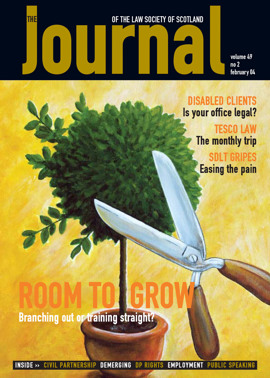Making the ends of justice meet
Yet again the phrase “justice on the cheap” is on the news agenda in Scotland. First, we were told that there is still serious underfunding of the Crown Office and Procurator Fiscal Service which has produced low morale. Then the Faculty of Advocates issued a surprisingly strong statement claiming that the Scottish courts are making excessive use of temporary judges for both civil and criminal cases simply to save money. This was followed by a leaked copy of a draft of the McInnes Report on Summary Justice, which appears to suggest that there should be a two tier system of summary cases with stipendiary magistrates, who receive about half a sheriff’s salary, taking the bulk of minor cases.
The instinctive reaction of the profession is that the Executive should spend more on both criminal and civil justice, to provide the citizen with a better service. “Justice on the cheap is justice denied” is the refrain.
But the profession cannot deny that the Scottish Executive has met at least some of the funding problems in the justice system. We now have many more supreme court judges appointed, and more permanent sheriffs. The rate of pay for fiscals has increased considerably. At long last, it appears that something is going to be done about the disgracefully low rates of legal aid remuneration.
But there must be widespread concern that the extra expenditure does not appear to have produced a more efficient and effective justice system. It seems that the additional judges and sheriffs hear fewer cases than formerly. In criminal matters, this may be met to some extent by the Bonomy reforms. Civil cases, however, except those in the commercial courts, still seem to take an interminable time to be resolved.
So, too, it must be very disheartening for the Lord Advocate’s office to learn that the extra funds which have been found for the Procurator Fiscal Service have not, at least according to press reports, produced a corresponding boost to morale.
On the basis of recent experience, there appears to be a question as to the effectiveness of the allocation of funding to the justice system. Rather than continue with the traditional Scottish piecemeal approach to reform, should the Executive and the profession not get together and agree that there should be a full blown review of the way the justice system operates? Hard statistical evidence is needed to aid those who would seek to reallocate resources to produce a better system. Would it not make sense to look at the whole picture, enabling the Executive to target its application of public funds?
For its part, the profession must recognise that the Executive does not have unlimited funds to spend on the justice system. It is better for the profession to participate actively in the process of determining where the finite funds will go, rather than be involved in ad hoc battles to obtain money for particular areas. Working in partnership with the politicians, the profession can contribute greatly to the longer term planning and development of the justice system. Contrary to what the public may think, lawyers are far from averse to reform. Lawyers are in the forefront of implementing the changes which Parliament and the Executive visit on them in the plethora of legislation now handed down from both Westminster and Holyrood.
The legal profession is full of talented people who, over the past few difficult years, have shown themselves able to adapt to radical changes in working practices. Lawyers have demonstrated their willingness to respond to politicians’ demands for radical rethinks on long-established aspects of our legal system. Given the rising cost of litigation and the restrictions on eligibility for legal aid, it is clearly in their interests, and their clients’, to come forward with innovative solutions to simplify the justice system, so making it less expensive without sacrificing its effectiveness. None of this need mean less remuneration for lawyers. In fact, a more efficient system should deter fewer clients and allow more lucrative rates for the profession.
The useful relationships already in place between the Society, as the profession’s representative body, and the Scottish Executive must be encouraged to develop to a point where there is a meaningful and permanent partnership with a clear agenda to change and develop the justice system against a background of common interest in the outcome.
In this issue
- It's a funny old world
- Making the ends of justice meet
- Training for growth
- All the grocer's grandchildren
- Radical change or a lie in law?
- Costing the job
- Are you listening?
- Much ado about nothing?
- Demergers and continuing cover
- Bond with the audience
- Many roles, one team
- Fee sharing: making the rules work
- On sentencing
- Credit reform by instalments
- Scottish Solicitors' Discipline Tribunal
- Show us the evidence!
- A new era for farm tenancy law
- Fathers' rights: a new UK postcode lottery?
- Parallel imports: putting on the brakes
- Website reviews
- Book reviews
- SDLT 1: Over the obstacle course
- SDLT 2: Personal presentation
- The new law of real burdens
- Housing Improvement Task Force






